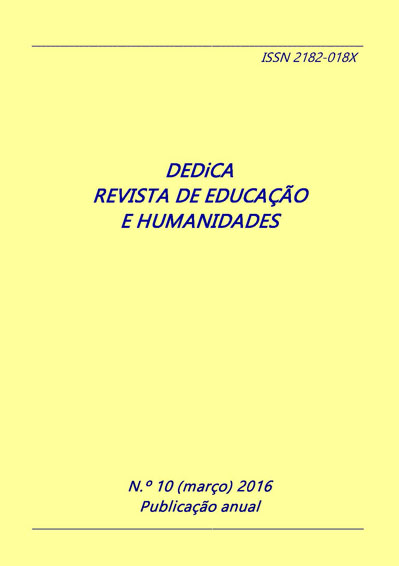Skills development in children’s education text books. Valuation survey
DOI:
https://doi.org/10.30827/dreh.v0i10.6859Keywords:
Preschool Education, skills, text books, teachersAbstract
This paper reports on an educational study based on the Council of Andalusia’s Educational Investigation Project PIV-006/13, whose main goal was to analyze and assess the educational consequences that Basic Competences have had in children’s education text books. This research springs from the constant concern of educational institutions in finding a methodology which will bring about improvement and change to favor the needs, interests and demands of our citizens and especially of our students. So we believe that one of the most important issues is to discover how text books have developed and adapted to different curricular changes and whether they address the stipulation of the current Preschool Education Curriculum of working by Competences in the classroom (LOE, 2006 y LOMCE, 2013). For this purpose we developed a survey in order to critically analyze what text books actually attempt to convey to our students.
To this end, we analyzed four of the main Spanish publishers from the point of view of Pre-school teachers. From this analysis we focused on three different fields (dimensions) at this Stage: knowledge of oneself and personal autonomy, Knowledge of the environment, and Language (communication and representation), as well as a fourth methodological field. In order to develop this last part we created a survey of 73 items, validated by experts, which sounded out different opinions of teachers who belong to this field.
Downloads
References
Alvarado De Llanos, L. (2015). La vida social en las imágenes de los libros de texto en educación infantil. Trabajo Fin de Grado [TFG] sin publicar. Santander: Universidad de Cantabria.
Boyatzis, R. E. (1982). The competent manager: a model for effective managers. New York: John Wiley & Sons.
Delors, J. (1996). “Los cuatro pilares de la Educación”. En La Educación encierra un tesoro. Informe a la UNESCO de la Comisión internacional sobre la Educación para el siglo XXI. Madrid: Santillana.
Del Pozo, M. (2011). Inteligencias múltiples en acción. Barcelona: Tekman Books.
Fernández Reiris, A. (2004). El libro y su interrelación con otros medios de enseñanza. Buenos Aires: Miño y Dávila.
Fernández Reiris, A. (2005). La importancia de ser llamado “libro de texto”. Hegemonía y control del curriculum en el aula. Buenos Aires: Miño y Dávila.
Le Boterf, G. (2001). Ingeniería de las competencias. Barcelona: Gestión 2000.
McClelland, D. C. (1973). Testing for competencies rather than intelligence. American Psychologist, 28, p.1.
MECD (2006). Ley Orgánica 2/2006, de 3 de mayo, de Educación. (LOE). Madrid.
MECD (2014). Ley Orgánica 8/2013, de 9 de diciembre, para la mejora de la calidad educativa (LOMCE). Madrid.
Martínez Bonafé, J. M. (2002). Políticas del libro de texto escolar (Vol. 9). Madrid: Morata.
Martínez Bonafé, J. (2007). El libro de texto, ¿un recurso para la innovación educativa? Aula de innovación educativa, 15(165), 12-14.
Molina, M. D.; Pérez García, A.; Antiñolo, J. L. (2012). Las TIC en la formación inicial y en la formación permanente del profesorado de infantil y primaria. EDUTEC, Revista Electrónica de Tecnología Educativa, 41. Disponible en:
OCDE (2003). The PISA 2003 Assessment Framework: Mathematicas, Reading, Science and Problem Solving Knowledge and Skills. París: OECD.
Organización Internacional del Trabajo -OIT- (2004). Recomendación sobre el desarrollo de los recursos humanos. Recomendación 1995. Ginebra: OIT.
Pro, A. (2008). Jugando con los circuitos y la corriente eléctrica. En E. Banet Hernández; V. Carbó Cortina; J. M. Domínguez Castiñeiras et al.. El desarrollo del pensamiento científico y técnico en la Educación Primaria, 43-82. Madrid: ISFP.
Rodríguez, J. (2012). Diseño, aplicación y evaluación de una propuesta didáctica para trabajar la temática de la energía en Educación Primaria. Tesis de Maestría, sin publicar. Murcia: Universidad de Murcia.
Rodríguez, J. (en prensa). Jugando con los Circuitos Eléctricos: un estudio de una propuesta didáctica desde la perspectiva del desarrollo por Competencias. 3º Premio de Investigación Educativa “Antonio Domínguez Ortíz”. Sevilla: Consejería de Educación. Junta de Andalucía.
Torres, J. (2011). Infantilización. En J. Torres, La justicia curricular. El caballo de Troya de la cultura escolar, 251-255. Madrid: Morata.
Vieites (2009). Programación por Competencias en Educación Infantil. Vigo: Ideasproias Editorial.
WCEFA (1990). World Declaration on Education for All and framework for action to meet basic learning needs. New York: WCEFA. Disponible en: http://www.unesco.org/education/efa/ed_for_all












